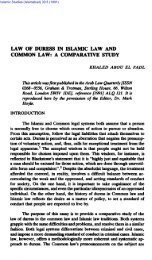THE ECONOMIC DILEMMA OF THE MUSLIM WORLD
THE ECONOMIC DILEMMA OF THE MUSLIM WORLD
THE ECONOMIC DILEMMA OF THE MUSLIM WORLD
Create successful ePaper yourself
Turn your PDF publications into a flip-book with our unique Google optimized e-Paper software.
Islamic Studies 35 : 3 I 1 996) 295<br />
Companions around him, may God be pleased with them, to equip this beggar<br />
as a wood-cutter, and told the person concerned to gather tire-wood so as to eat<br />
from the sweat of his own hands.<br />
If we analyse the story in its moral context, we see how the Prophet,<br />
peace be upon him, resolved a social crisis which presented itself in the form<br />
of a beggar from among the poor. He preferred its solution in the framework<br />
of "duty" over "right". Or, if we look at its economic dimension, we see him<br />
preferring a solution in the framework of "production".<br />
The stand of the Prophet, peace be upon him, in all other cases<br />
supports this direction. Indeed this guidance for his ummah stands good in the<br />
moral as well as the economic field. We see him giving it to a companion in<br />
another instance. The latter asked from those present what he required and got<br />
it. He repeated his demand and was again granted. When the demand and grant<br />
were repeated a third time, the guidance came in a distinct form. The Prophet,<br />
peace be upon him, told the applicant: ". . . The upper hand is better than the<br />
lower . . ."<br />
The hand that gives is better than the hand that takes. This is the<br />
direction, whether we interpret it morally or economically.<br />
Returning now to the algebraic equation between production and<br />
consumption, and considering it in the light of the economic-moral relationship<br />
presented above, we can now look into its various possibilities. These indicate<br />
three states. A society would rcalise any one of them in accordance with its<br />
cultural orientation. Corresponding to its emphasis on the concept of "duty" or<br />
of "right", its economic equation would be positive if production exceeds<br />
consumption; balanced or zero if the two sides are equal, or negative if<br />
consumption weighs more in the balance.<br />
In the first case, the society can invest the surplus production in future<br />
operations and budget: It is a developing society. In the second case, the two<br />
scales of its budget are balanced so that the one does not outweigh the other,<br />
neither going up, nor going down.: It is a stagnant society. In the third case, the<br />
scale of consumption is preponderant; it neither goes up nor stabilises. It is a<br />
society heading towards collapse.<br />
The shift of emphasis from "right" to "duty" is not something which<br />
comes about spontaneously or by accident. It is a transformation of habits and<br />
dispositions in harmony with the natural human inclination towards the logic of<br />
convenience, reinforced by 20th century demagogy. The latter has made "ME"<br />
a new idol which the individual worships in the name of liberty in the political<br />
field and in the name of rights in the economic field. Even in the field of sports,<br />
one worships the "ME" embodied in the stadiums. Hence the transformation of<br />
inherited focuses or preferences is no easy task but can be brought about only<br />
through a hard struggle against the tendencies which nurture egocentrism in its<br />
two forms: ME and WE.<br />
To counter the cultural revolution - for modifying the emphasis in<br />
favour of duties - there might take place a counter-revolution to prop up the<br />
perverted structure. This is what precisely happened in China when an effort
















